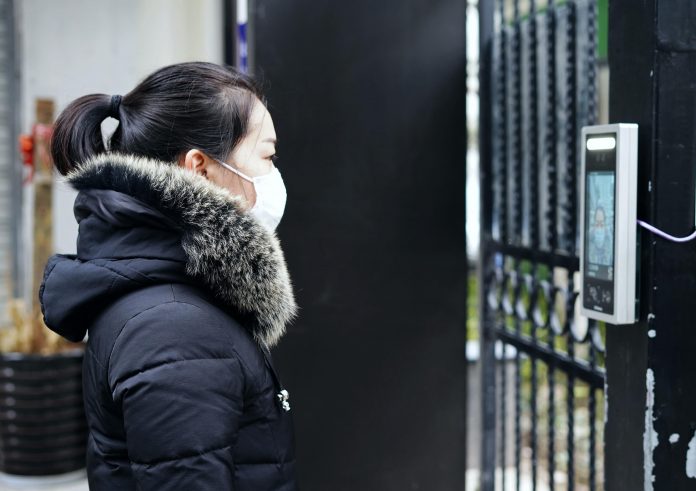Facial recognition companies are pitching the technology as a sanitary alternative to fingerprint scanners.
The Covid-19 crisis enveloping millions of people around the world is also presenting an unlikely business opportunity for one sector of tech: facial recognition technology. Companies including DERMALOG in Germany and Telpo in China are pitching the technology as a method for identifying individuals without the risk of close contact.
Fingerprint scanners, for instance, require that many people touch the same surface, which could potentially spread infection if someone with Covid-19 were to use an unclean scanner. Businesses in India are being directed by police to ditch fingerprint authentication in lieu of facial recognition or ID cards, and the NYPD is pausing its fingerprint entry amid coronavirus concerns.
Companies are eager to make facial recognition the default form of identification are rushing to fill the void.
“In the face of this outbreak, we have developed a solution for non-contact body temperature measurement plus face recognition.”
DERMALOG, a biometrics company that makes fingerprint, iris, and facial recognition hardware, has adapted its technology to determine the temperature and is pitching the update as a safety feature. It’s already in use by the Thai government for border control. Telpo is launching temperature-sensing terminals with facial recognition, which allegedly work even if a person is wearing a face mask.
“In the face of this outbreak, we have developed a solution for non-contact body temperature measurement plus face recognition in order to meet the rapid need to diagnose the patient and isolate and control the virus in time,” Crystal Chu, a platform marketing specialist at Telpo, wrote to OneZero in an email.
And the company is touting the benefits of facial recognition beyond the coronavirus pandemic.
“This technology can not only reduce the risk of cross-infection but also improve traffic efficiency by more than 10 times, which will save time and reduce congestion. It is suitable for government, customs, airports, railway stations, enterprises, schools, communities, and other crowded public places,” the company wrote separately in a press release.
Another Chinese company, Wisesoft, is also bundling facial recognition and temperature-sensing technology.
Meanwhile, manufacturers of fingerprint scanners are pushing back.
“People like facial recognition or iris companies are saying, ‘Well you don’t want to use fingerprint scanners anymore, they’re bad for you because of this virus. I think that’s a little ridiculous,” says David Gerulski, executive vice president of Integrated Biometrics, a firm that specializes in lightweight and mobile fingerprint scanners.
The company has been communicating with customers for weeks about how to properly clean the devices and advising that those who use the scanner should use hand sanitizer afterward.
Gerulski points out that he’s heard recommendations that people should use the iris scanners on Clear’s biometric machines at airports rather than its fingerprint function, but that requires holding your face close to a shared surface.
“The main thing is we want to make sure there aren’t terrorists who take advantage of this time period when everybody’s worried about viruses and then something bad happens,” Gerulski said.
Automated fingerprint analysis has been the most common form of biometrics since its invention and adoption in the 1980s.
NEC, the Japanese technology company, was the first to build and market automated fingerprint analysis for forensic use by police and federal investigators. The company has now morphed into one of the biggest companies selling biometric technology across the world, and it pitches facial recognition as the most cutting edge of its offerings.
Covid-19 has also spurred technology companies to market facial recognition algorithms that work even when someone is wearing a mask. Companies like China’s Hanvon and Spain’s Herta have announced their facial recognition is works with or without wearing a mask as well.
Facial recognition is also being used amid the pandemic to determine if people are following local regulations. Baidu’s facial recognition can look for people who aren’t wearing masks in China since masks have been deemed mandatory in many parts of the country.
Russia is using facial recognition to track those who are leaving their quarantine. One Moscow resident was visited by police after violating his quarantine by taking out the trash, according to the Moscow Times.
In Shanghai, communities are installing facial recognition in residential buildings to reduce contact with shared physical surfaces.
Other residents in China, where facial recognition partnered with temperature sensing has become commonplace, wonder whether this level of surveillance will subside after the virus has been contained, according to The Guardian.
“This epidemic undoubtedly provides more reason for the government to surveil the public. I don’t think authorities will rule out keeping this up after the outbreak,” activist Wang Aizhong told The Guardian.
medium.com

Putting a spotlight on business, inventions, leadership, influencers, women, technology, and lifestyle. We inspire, educate, celebrate success and reward resilience.















